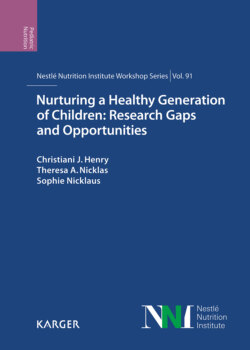Читать книгу Nurturing a Healthy Generation of Children: Research Gaps and Opportunities - Группа авторов - Страница 14
На сайте Литреса книга снята с продажи.
Introduction
ОглавлениеEarly childhood is an important period for the development of health. Recent researches using different approaches (experimental or epidemiological) have shown the importance of this early period for metabolic programming [1]. This general concept of the “Developmental Origin of Health and Disease” (DOHAD) has been refined in humans to highlight the importance of the first 1,000 days for the development of health status [2]. In this context, our specific focus is on understanding how eating behavior is programmed during this period of the first 1,000 days. As a first observation, eating behavior undergoes a strong development during this period, in particular because the mode of feeding drastically evolves from conception until the age of 2 years. This implies that the child has to learn “how” to eat but also “what” to eat, “how much food” to eat, and “in which context” meals take place. After birth, when orally exposed to foods, infants discover their intrinsic properties, with a variety of tastes, flavors, textures, as well as energy densities, and all these aspects become even more salient at the onset of complementary feeding. By the end of the second year, food neophobia, i.e., the refusal of new food, develops [3–5]. We have previously observed that eating behavior established at the end of this period tracks on later into childhood and up to early adulthood [6–9]. Altogether, this calls for a better understanding of the driving factors and the key periods for the establishment of eating behavior during the first 2 years of postnatal life.
Here, we report several works in which we focused on deciphering the involvement of taste and olfaction in the early establishment of eating behavior over the first 2 years of postnatal life. We focused on both senses because they both strongly relate to the oral phase of feeding and because the chemosensory environment evolves strongly during this early period of life [10, 11]. In the frame of the OPALINE French birth cohort (Observatory of Food Preferences in Infants and Children), taste and flavor preferences were studied independently in children, as well as food acceptance and food neophobia over the course of the first 2 years of life.
